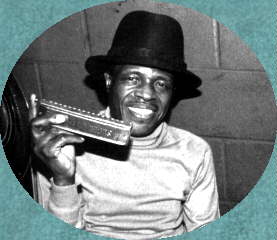

Junior Wells
(born Amos Blakemore)
December 9, 1934 - Present
Birthplace: Memphis, Tennessee
Junior Wells has been one of the principal blues harmonica stylists of
Chicago's postwar era. Following in the footsteps of John Lee "Sonny Boy"
Williamson and especially Little Walter Jacobs, Wells helped define the Chicago blues harp
sound in the 1950s, first with the Aces, then with Muddy Waters and Buddy Guy, and finally
as a solo artist. Since then, his sweeping harp solos, which often include articulate
staccato wails and a sense of phrasing not unlike Little Walter, as well as his
whiskey-soaked vocals, have made Wells one of the deans of Chicago blues.
Born and raised in Memphis, where he learned the rudiments of the blues harp from Junior
Parker, Wells moved to Chicago in 1946 and fell in with Louis and David Myers. Calling
themselves the Three Deuces, then the Three Aces, Wells and the Myers brothers played
house-rent parties and occasional club dates in the late '40s. When they added drummer
Fred Below in 1950 they became simply the Aces. Wells performed with the group-one of the
best of Chicago's early postwar period-until 1952 when Muddy Waters asked him to take the
place of Little Walter in his band. Ironically, Little Walter then took Wells' place in
the Aces.
Wells' first stint with Waters lasted barely a year; in 1953 he was drafted. Not the army
type, Wells went AWOL later that year and returned to Chicago to play with Waters and cut
some sides for the States label. (The only song Wells recorded at the time with Waters was
'Standing Around Crying" for Chess.) Wells eventually returned to military duty and
was discharged in 1955. When he came back to Chicago, Wells worked for Waters for a short
while, before reforming a version of the Aces. Wells and his band worked Chicago clubs and
frequently toured, playing black clubs in northern cities and the Southern blues circuit.
In 1958 Wells began playing with guitarist Buddy Guy, forging a loose partnership that
continued on and off for nearly two decades. Although Wells had been making records for
the Profile and Chief labels and had backed up Guy for some of the material he cut for
Chess in the early '60s, it wasn't until 1966, with the release of the album Hoodoo Man
Blues (Delmark), that Wells became a major recording figure outside Chicago. A certified
classic, the album produced "Hoodoo Man Blues" (116 k, 10 sec.) and featured
Wells' scintillating harp and vocal work and Guy's backing guitar riffs and captured the
vinegary blues of one of the most powerful Chicago bar bands of the '60s. The success of
the Wells-Guy recording team on the Vanguard label continued with such Wells albums as It
's My Life, Baby!, partly recorded live at Pepper's Lounge in Chicago, and Coming at You.
In 1970 Buddy Guy and Junior Wells toured Europe with the Rolling Stones; two years later
they released Play the Blues, an Atco album that featured cameos by Eric Clapton, Dr.
John, and the J. Geils Band. Another live Wells album, Drinkin' TNT 'n' Smokin' Dynamite,
featured the Stones' Bill Wyman on bass. Through the rest of the '70s, Wells was a fixture
on the Chicago club scene, often performing at the noted blues club Theresa's Lounge.
During the '80s blues renaissance, Wells continued playing festivals and touring. In 1990
he recorded the album Harp Attack! with fellow blues harmonica players James Cotton, Carey
Bell, and Billy Branch. Wells continues to perform regularly.
"Hoodoo Man Blues" is from Hoodoo Man Blues--Junior Wells' Chicago Blues Band
with Buddy Guy Copyright © Delmark Records, 1966.